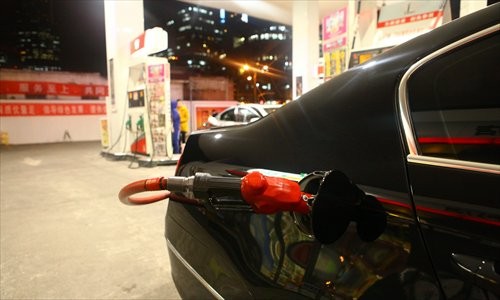
A government draft regulation proposes to cut emissions by lowering sulfur content in fuels, at the expense of their anti-knock property. Car emissions are the No. 1 source of air pollution in Beijing
Beijing intends to improve fuel quality, especially by reducing the sulfur content in gasoline.
Residents are happy to see the reductions in automobile exhaust emissions, a big source of air pollution, but they are also concerned about rises in gasoline prices.
The Beijing Bureau of Quality and Technical Supervision (BBQTS) launched a draft regulation of new standards applying to gasoline and diesel in the city on its official website Wednesday, and asked the public to submit opinions by January 7.
In the new standards, the current fuel grades, which have octane ratings of 90, 93, and 97 will be replaced by lower octane ratings of 89, 92 and 95 to "meet a stricter emission standard."
Octane ratings are a general measure of the anti-knock, or the performance of an engine, and generally, the higher the number, the better the performance. However, BBQTS told the Beijing Evening News that in order to lower the sulfur content, the anti-knock ability will be slightly reduced, but within a small range. Drivers would not feel any difference, BBQTS said.
The stricter emission standards were revealed by the Beijing Municipal Environmental Protection (BMEP) this January, saying that Beijing would impose the national standard V (based on Euro V guidelines, the strictest emission standard at present) for vehicle emissions in 2012, around the same time as developed countries.
Beijing municipal government raised vehicle emission standards four times from standard I in 1999 to Standard IV in 2008. With each rise, pollutant amounts allowable from a single vehicle dropped by around 30 to 50 percent.
Standard IV refers to a sulfur content of 50 ppm (parts per million), and Euro Standard V calls for reductions in sulfur to 10 ppm.
Statistics from BMEP show that although coal burning, fuel burning and gas burning all emit nitrogen oxides, half of those in Beijing come from vehicle emissions, the biggest source of air pollution.
"A key problem in the new standards lies in the requirements of sulfur content reduction in the gasoline, which requires different gasoline refining techniques, so the grades of the gasoline are accordingly changed," an official from BBQTS told the Beijing Evening News.
According to the draft regulation, the sulfur content in gasoline should be reduced by five times less than the current standards.
"We'll adopt the regulations issued by the government strictly, but it won't be easy to manage the sulfur reduction by five times on the technical level, and that definitely means an increase in costs," said a sales manager surnamed Wei, from petrochemical company Shell (China).
"It would be good if vehicle fuel contributes less pollution to the air, but I hope the government will figure out a way not to raise gasoline prices, which are already very high," said Wang Xuan, a local driver.
According to a Xinhua news report, Sinopec Beijing Yanshan Company concluded that there would be a reduction in sulfur dioxide emissions of about 210 tons a year after the new standards are implemented, taking into account the current annual consumption of gasoline and diesel fuel being 3,500,000 tons a year in Beijing.
"Reductions in sulfur content in gasoline mean less sulfur dioxide in vehicle exhaust emissions, which is responsible for acid rain as well as a major contributor to PM2.5," said Zhang Yuanxun, professor of Chinese Academy of Sciences.
PM2.5 refers to fine air particulates with a diameter of 2.5 microns or less, which contribute to pollution. The particles can penetrate the lungs or even enter the blood stream, causing asthma, lung cancer and cardiovascular disease. At present, Beijing environmental authorities only measure particulate matter up to PM10, or 10 microns or less.
"It's a good move for environmental protection that the capital badly needs right now, and a long overdue step to catch up to the fuel quality in Japan and some Western countries," said Zhang.

Copyright ©1999-2011 Chinanews.com. All rights reserved.
Reproduction in whole or in part without permission is prohibited.